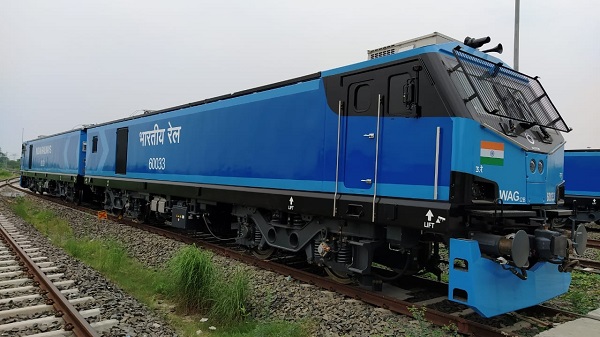New Delhi, (Samajweekly) The world’s most powerful locomotive manufactured by French giant Alstom along with the Madhepura Electric Locomotives Pvt Ltd, capable of running at maximum 12,000 HP, joined operations of the Indian Railways on Monday, officials said.
“Bolstering Prime Minister Narendra Modiji’s vision of Make in India, first WAG12B (12000 HP) loco departed from Pandit Deen Dayal Upadhyay station in Uttar Pradesh today. Powerful and capable of high speed, the locomotive is a significant addition to the Indian Railways,” tweeted Union Railway Minister Piyush Goyal.
According to Railway officials, WAG12B started its services from Pandit Deen Dayal Upadhyay railway station (Mughalsarai Junction) in Uttar Pradesh on Monday.
The train departed from Deen Dayal Upadhyay station at 2.08 p.m. in long haul formation for Dhanbad division of East Central Railway, consisting of 118 wagons which travelled from Pandit Deen Dayal Upadhyaya Junction to Barwadih via Dehri-on-Sone, Garhwa Road stations.
The locomotive is capable of taking heavy consingment of freight and will be used on the Dedicated Freight Corridor (DFC).
“Alstom is pleased to start delivery of the electric locomotives to Indian Railways. Commencement of induction into the IR fleet, testifies our commitment towards the country. This is a revolutionary product which will be faster, safer and eco-friendly. Also, it is scripting a new chapter for India’s sustainable mobility journey and we are happy to be partnering in this,” said Alain Spohr, Managing Director, Alstom India and South Asia.
A railway ministry spokesperson said that it was a proud moment for Indian Railways, as it became the sixth country in the world to join the elite club of producing high horse power locomotives indigenously.
“It is the first time that a high horse power locomotive has been operationalised on broad gauge track in the world. The locomotive has been produced under Make in India programme. The Madhepura factory is the largest integrated greenfield facility built to the highest standards of quality and safety with production capacity of 120 locomotives and spread across a massive 250 acres.”
Railway officials said that the locomotive is capable of running on railway tracks with conventional over head wire (OHE) lines as well as on DFC with high rise OHE lines.
The official further said that the locomotive has air-conditioned driver cabs on either side.
“The locomotive is equipped with regenerative braking system which provides substantial energy savings during operations. These high horse power locomotives will help to decongest the saturated tracks by improving average speed of freight trains,” the spokesperson said.
Touted as the largest Foreign Direct Investment (FDI) projects of the Railways, the Ministry of Railways and Alstom came together in 2015.
An agreement worth 3.5 billion euros was signed to manufacture 800 electric locomotives for freight services and its associated maintenance.
These locomotives are state-of-the-art IGBT-based, 3 phase drive, 9000 KW (12000 horse power) electric locomotives. The locomotive is capable of maximum tractive effort of 706 kN, which is capable of starting and running a 6000 T train in the gradient of 1 in 150. The locomotive with twin Bo-Bo design having 22.5 T (tonnes) axle load is upgradable to 25 tonnes with design speed of 120 kmph.
The locomotive will be used on the Dedicated Freight Corridor (DFC) for the faster movement of goods, especially coal and iron ore.
The railway official said that the project started in 2018 and Modi inaugurated the project on April 10, 2018.
The prototype locomotive was delivered in March 2018. Based on the test results having design issues, the complete locomotive including bogies was redesigned. The new design of locomotive has been inspected by Research Design and Standards Organisation (RDSO) at Madhepura factory and cleared for dispatch from factory in November 2019, the official said.
He said RDSO has conducted oscillation trials at various speeds upto 132 kmph and the locomotive has passed oscillation trials successfully.










